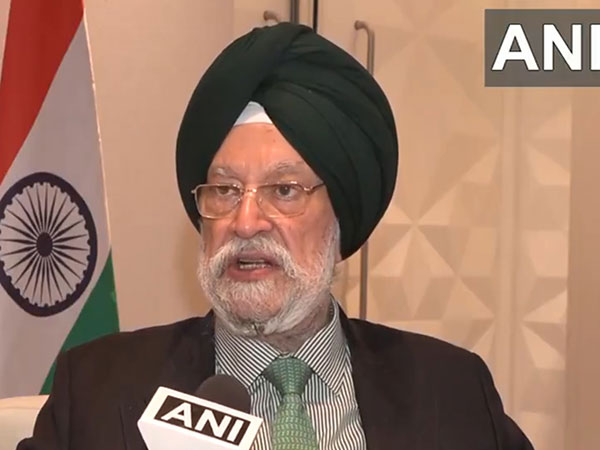"LPG price increase will enable oil companies to offset their under-recoveries": Hardeep Puri
Apr 08, 2025

New Delhi [India], April 8 : Union Minister for Petroleum and Natural Gas, Hardeep Singh Puri, reiterated that the government remains committed to providing affordable LPG cylinders to consumers, despite a significant rise in international LPG prices.
Under the updated pricing structure, a 14.2 kg LPG cylinder, which now costs Rs 1028, will be made available to Ujjwala beneficiaries at a subsidised rate of Rs 553, which is Rs 475 less than the market price. Regular consumers will benefit from a Rs 175 reduction, bringing the price of the cylinder down to Rs 853.
Puri explained that this price hike was necessary to help oil marketing companies (OMCs) recover the financial losses caused by previous subsidised prices, which have been significantly lower than international market rates.
He emphasised that the move will ensure that consumers continue to receive affordable LPG while also supporting the sustainability of the domestic fuel market.
The minister assured that this price adjustment would be closely monitored and reviewed in the coming days to ensure that future changes remain in line with global price fluctuations and continue to prioritise the well-being of the public.
https://x.com/HardeepSPuri/status/1909276731036303684?t=HqZT1AZnh24Eosssv1gC7Q&s=08
In a post on X, Hardeep Puri said, "We have been providing affordable LPG cylinders to our customers before, and we will continue to do so. The international benchmark for LPG, Saudi CP, saw a 63 per cent price increase (from $385/MT in July 2023 to $629/MT in February 2025), while during the same period, LPG prices in India were reduced by up to 44 per cent. This resulted in a significant loss of Rs 41,338 crore for OMCs last year."
"Between October 2022 and April 2025, LPG prices in neighboring countries increased by 10 per cent +, whereas even after today's hike, prices in India have decreased by approximately 19 per cent. Even after today's Rs 50 cylinder hike, a 14.2 kg LPG cylinder costing Rs 1028 will be provided to Ujjwala beneficiaries at Rs 475 less per cylinder, i.e., Rs 553, and to regular consumers at Rs 175 less per cylinder, i.e., Rs 853. This price increase will enable oil companies to offset their under-recoveries so that consumers continue to receive affordable fuel. This hike will also be reviewed in the coming days," his post read.
LPG cylinders, both Ujjwala and non-Ujjwala, will be Rs 50 dearer starting Tuesday, Minister Hardeep Puri announced on Monday at a press conference.
"The price per cylinder of LPG will increase by Rs 50 from Rs 500, it will go up to Rs 550 (for PMUY beneficiaries), and for others, it will go up from Rs 803 to Rs 853," the minister said.
"This is a step which we will review as we go along. We review these every 2-3 weeks," he added.
The minister said the imposition of additional excise duties on petrol and diesel is intended to compensate the oil marketing companies for losses they have incurred earlier.
"The two rupee excise duty has been imposed by the finance ministry. It will not be passed on to the consumer. It will come into the general kitty, and it will be utilized for reimbursing the LPG losses of the same (oil marketing) company," the minister added.
According to a notification from the Department of Revenue, the central government has raised the excise duties on diesel and petrol by Rs 2 per litre, effective Tuesday.
Currently, the government charges excise duty of Rs 19.90 per litre on petrol. From Tuesday, it is going to be increased to Rs 21.90 a litre. Similarly, the current excise duty on diesel is Rs 15.80 per litre, and it will increase to Rs 17.80 per litre effective Tuesday.
Oil marketing companies have informed the Petroleum Ministry that retail prices of petrol and diesel will remain the same.
Crude prices have softened over the past week from over USD 70 per barrel to USD 63 per barrel on Monday, raising margins for the oil marketing companies (OMCs).
This substantial decline in oil prices may have prompted the government to hike the excise duties on petrol and diesel.


















